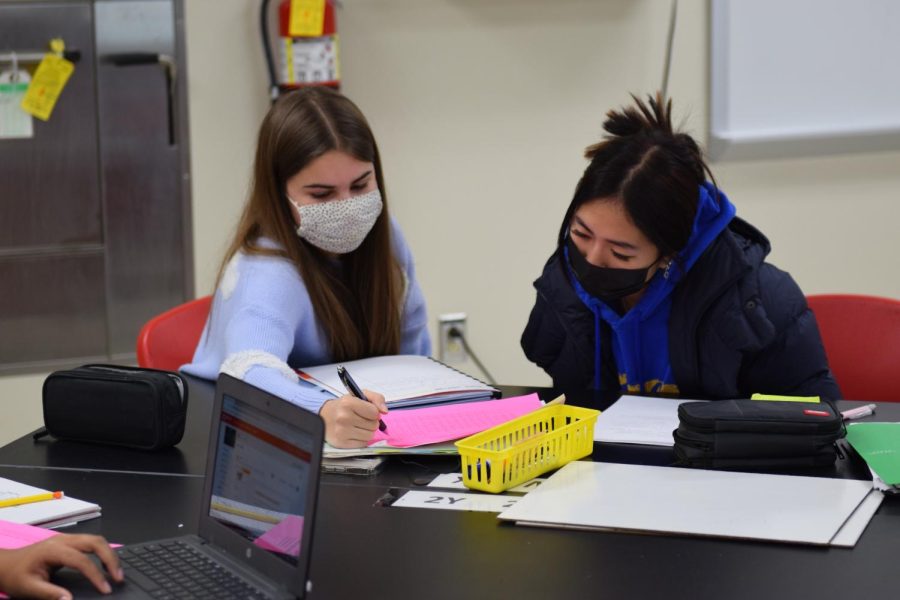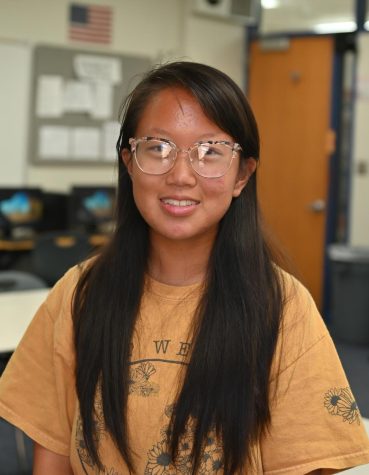Paving a New Way Forward
Feminist club empowers women to pursue careers in STEM
Nina Buzzotta (11) and Sidney Tran (11) work through problems in Beth Karfs’ AP Chem class on Jan. 27.
January 13, 2022
In November 2020, Nina Buzzotta (11), then a sophomore, proposed a club promoting and exploring various STEM fields, while specifically encouraging women to pursue those career paths. STEM careers are traditionally viewed as masculine, leading to less women pursuing those fields, even though they may have an interest in subjects such as math or science.
“I think that if we like subjects like math, we’re fully capable of it if we’re given the proper materials to learn those subjects,” Buzzotta said. “Then we are for sure capable of not only doing those, but also thriving in those careers. There’s pressure because we’re not represented in careers like mathematics, and we feel as though we don’t belong there.”
After pitching the club Young Women in STEM (YWIS), Buzzotta put together a sponsor and director’s board, and since then, the club has introduced members to activities such as coding and suturing, and listening to female guest speakers in STEM fields such as civil engineers and computer analysts. Beyond that, the club also participates in community service, such as a period poverty drive conducted in the past winter. Their reach began primarily through a prominent social media presence, deemed necessary due to an online-only start.
Cofounder Blair O’Connor (11) supported Buzzotta throughout the early process, and was on board from the beginning. Although O’Connor was initially more drawn towards the feminist aspect of the club than STEM, the atmosphere gradually grew on her.
“I think the beauty of the club is that before, I thought that I would never want to go into math or something like that,” O’Connor said. “I think being part of the club made me think about these careers with space or technology.”
On the other hand, Buzzotta has been passionate about the medical field for quite some time, spending time in both the Medical Club and Science Olympiad. In the pursuit of learning and knowledge beyond the classroom, Buzzotta took part in a summer course called Biology of the Brain.
“I was one of few women, so it was very intimidating,” Buzzotta said. “It feels like you don’t belong there, which is why we need representation so women are empowered, and know that they belong in these STEM careers.”
Personal experiences have played into each aspect of the club, from details such as how long the meetings are, to long term goals for expanding the presence of the club.
“Being involved in other clubs has helped me realize what people want in a club,” O’Connor said. “I’m involved in a lot of sports, so we try to make our meetings after school as short as possible, and make sure people know it’s okay if you have to miss a meeting. It’s difficult to play a sport and do a club at the same time.”
Women are statistically underrepresented in STEM careers due to cultural factors such as the myth of the “math brain,” which is the belief that the male brain is more suitable to learning math, the lack of attraction that male-dominated field hold for women, and the lack of well known female role models in STEM careers. These biases, whether intentionally or unintentionally, have become ingrained in many people. In a study conducted in 2014, when hiring employees for a math job, scientists gave people in the role of employers only a photograph. Even with such limited information given to both male and female employers, men were twice as likely to be hired for the job. In a separate study done in the same year, scientists found that women tend to underestimate their math skills, while men tend to exaggerate their abilities. While in a hiring position, women also tend to underestimate female applicants. This lack of confidence is harmful, and a belief that Young Women in STEM is making steps to reverse.
After negative experiences in Robotics Club as a freshman, Samantha Hajdukiewicz (11) appreciates the steps forward that clubs such as Coding Club and YWIS have taken to involve women.
“I joined Robotics freshman year because I wanted to construct the robot or code some programs for the robot,” Hajdukiewicz said. “But every time I tried to build, I kept on getting pushed back. All of the people who were doing the building, coding and all of the fun stuff on the robot itself were boys.”
Hajdukiewicz joined YWIS club last year, and although her schedule did not work with another club, appreciates the impact that the club had on her and others.
“I feel like being in the club really does help in the long run,” Hajdukiewicz said. “Even if STEM is a male-dominated community, there are other girls like me who want to pursue a career in a male dominated industry, and if they could do it, I know I can do it as well.”
Beth Karfs has taught chemistry in the science department for 15 years. Before, she was a chemical engineer, specifically a quality engineer in chemical plants, testing materials for car parts, answering customer complaints, and training others. Communicating with others proved challenging due to gender biases.
“If I were to talk to somebody on the line who didn’t think I knew what I was talking about because I was a girl, I would change the way I talked to them,” Karfs said. “So, I would still get what I needed from them without getting upset that they were treating me that way. So you really had to wordsmith it; ignore the fact that you were about to get talked down to and still get the job done.”
One of the main motivations for beginning the club YWIS was to draw attention to gender biases, which may not appear to be as prevalent in high school as it would have been in previous years, future advanced classes, and the workforce. However, gender roles are an obstacle that is not as far away as some may like to think.
“There was a time, maybe not so much now, but definitely in my childhood, girls were discouraged from math and science,” Karfs said. “They were talked down to a little bit in those classes by their teachers. I know I’ve had that experience when I was a kid. In fourth grade, I told my teacher I wanted to be an astronaut, and she said that girls can’t be astronauts. I went home, and I was all upset. I was just aghast.”
Members believe that YWIS is making positive changes in the school environment. Getting the word out that women do belong in STEM fields and there is a community waiting with open arms each Thursday after school, and dispersed throughout the classrooms of PCH are taking the necessary steps to reverse generations of bias.
“I’m so proud of everyone,” O’Connor said. “I think we’re starting to become a community of friends, and it’s just a great group of people. Everyone in that club has that interest in STEM and is passionate about being there.”
Of course, one club is not the cure-all for multilayered social issues such as prejudice. But the small instances of being present, even in a setting that makes one stand out, can build to inspire others. Also, although the title may lend to become naturally exclusive, there are no requirements for membership. Both co-founders welcome people of all genders to support and learn from each other. Differences, although divisive, can also be a great teacher.
“Find that common link that you have with people,” Karfs said. “It’s really that same advice that you’d give for anybody that felt a little bit socially out of place. The more you know about the people around you, the more you can find commonalities, and it becomes more natural to communicate with each other. So just because you work with a bunch of guys doesn’t mean you don’t have something in common. You’ve got to reach out and figure out what that is.”



